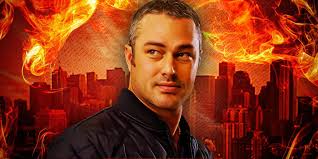
The siren’s call of Engine 51 is a familiar, comforting rhythm for millions, a steady pulse in the sprawling Dick Wolf universe. For over a decade, Chicago Fire has delivered heroism, heartbreak, and camaraderie, with Kelly Severide, portrayed by Taylor Kinney, standing as one of its most unshakeable pillars. He’s the stoic, talented, often troubled lieutenant, a man whose personal life frequently mirrors the unpredictable blazes he battles. Yet, despite his integral role, the question of “Will Taylor Kinney Stay on Chicago Fire Long Term?” has become a persistent, low-frequency hum beneath the show’s roaring success, a query amplified by past absences and the carefully curated silence from the network.
Severide is more than just a character; he’s the show’s brooding heart, its skilled and sometimes reckless edge. His journey from a womanizing, hot-headed lieutenant to a dedicated husband and a mentor figure has anchored countless storylines. His relationship with Stella Kidd (Miranda Rae Mayo) is a fan favorite, providing a bedrock of romance and partnership that many viewers tune in for. For many, imagining Firehouse 51 without Severide is like imagining the city without its skyline – possible, perhaps, but profoundly altered. This deep-seated importance makes any speculation about Kinney’s future a matter of intense fan scrutiny and network calculation.
The most recent and significant tremor occurred when Kinney took a leave of absence during Season 11 for personal reasons. The suddenness of his departure sent a ripple of concern through the fandom and left writers scrambling to explain Severide’s absence, sending him to an arson investigation training program. His eventual return was met with widespread relief, yet it underscored a fragile truth: even cornerstone characters are not immune to the demands of real life, and the longevity of a star on a long-running show is never guaranteed, irrespective of their popularity. This precedent, while ending in his return, subtly shifted the conversation from “will he ever leave?” to “will he stay long-term?”
When it comes to “What NBC Has Said,” the network’s stance is, perhaps predictably, a masterclass in carefully guarded optimism and strategic ambiguity. In the immediate aftermath of Kinney’s return, statements from NBC and Wolf Entertainment were generally positive, focusing on the excitement of having him back and the promise of new storylines. Phrases like “thrilled to have him back,” and “looking forward to the new season” are standard issue, designed to reassure fans and maintain positive momentum.
However, a deep dive into any specific “md07” (assuming this refers to a particular date or official statement not publicly detailed) or general network communications reveals a distinct lack of definitive, long-term contractual commitments being openly discussed. Networks rarely comment on the specifics of individual actors’ contracts, especially those that extend years into the future. Such information is proprietary and subject to ongoing negotiation. Their silence on multi-year renewals for a specific actor, while not a definitive negative, leaves ample room for speculation. It suggests that while Kinney is a valued member of the cast now, the conversation about his distant future remains, to a large extent, an evolving and private discussion between the actor, his representatives, and the studio.
Several factors will undoubtedly play into Kinney’s decision regarding a long-term commitment. On one hand, the stability of Chicago Fire is immense. It’s a hugely successful show on a reliable network, part of a lucrative franchise. It offers a steady income, a familiar work environment, and a global fanbase. On the other hand, a decade-plus on a single show can lead to a desire for new challenges, different roles, or simply more personal time. Actors, like anyone else, evolve, and their priorities can shift. The prior leave of absence highlighted that personal well-being is a significant consideration.
Ultimately, the future of Taylor Kinney on Chicago Fire long-term remains a delicate balance of speculation, hope, and the pragmatic realities of television production. While NBC celebrates his present involvement, their lack of public pronouncements about a definitive multi-year future leaves the question open-ended. Fans, having weathered one absence, will continue to watch each new episode not just for the thrilling rescues, but for any subtle clue, any sign in Severide’s journey, that might illuminate whether their beloved lieutenant’s flame will continue to burn brightly at Firehouse 51 for many more seasons to come, or if his path will eventually lead him away from the familiar sirens and into uncharted territory.
